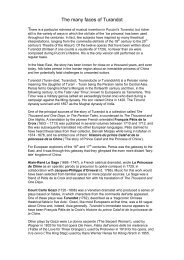NEF-Southampton-Positive-Money-ICB-Submission
NEF-Southampton-Positive-Money-ICB-Submission
NEF-Southampton-Positive-Money-ICB-Submission
Create successful ePaper yourself
Turn your PDF publications into a flip-book with our unique Google optimized e-Paper software.
effecGvely risk-‐free.<br />
These Guarantees Prevent the Banks From Passing On All the Risk<br />
These two ‘guarantees’ make it much more difficult for banks to pass all the risk onto the savers/investors.<br />
Since Investment Accounts are not guaranteed by the state or taxpayer, it would be possible for the banks to<br />
simply pass the risk onto the saver, by simply saying that if the value of the underlying investments falls, then<br />
the value of the Investment Account will also fall. This may seem fair, but it creates another ‘one way bet’ for<br />
the bank – if they make good investments, they get a cut of the gains, but if they make bad investments, the<br />
savers/investors take the full loss. This one-‐sided incenGve structure would likely lead to risky invesGng on the<br />
part of the banks. Allowing the banks to offer these two guarantees ensures that banks must shoulder part of<br />
the risks of an investment.<br />
No Government Guarantee on Investment Accounts<br />
The Treasury and government do not back the guarantees made by the banks. If a bank went bankrupt,<br />
Investment Account holders would become creditors of the bank and would have to wait for normal<br />
liquidaGon procedures to take place to see if they will get back part of their investment. While this is likely to<br />
be unpopular with savers who have, to date, been able to save without taking any risk at all (thanks to the<br />
taxpayer-‐funded guarantee) there is no morally or economically jusGfiable reason why savers/investors<br />
should have their investments effecGvely insured by UK taxpayers.<br />
The Bank of England May Forbid Specific Guarantees<br />
To prevent banks offering unrealisGc investment account guarantees, the Bank of England, in its new<br />
supervisory role, should be able to forbid an insGtuGon from offering a parGcular rate of return on a<br />
parGcular Investment Account product.<br />
We know from history that professionals in the financial sector are not very good at idenGfying bubbles while<br />
they are in one. When a bubble takes off in say, hotel construcGon, a bank has an incenGve to offer a beOer<br />
guarantee than all its compeGtors in a parGcular Investment Account product in order to aOract the<br />
maximum amount of funds for investment in the bubble. The guarantee they offer may be one that is based<br />
on the ‘best case scenario’.<br />
If the bank tries to offer an Investment Account product with a guaranteed rate of return of 8%, the Bank of<br />
England may judge that it is highly likely that the investments themselves will not generate a return of 8%,<br />
and therefore the bank will end up with a shoryall, which will increase the likelihood of the bank going<br />
bankrupt or appealing to the Bank of England for emergency funding. In short, offering a guarantee (on either<br />
the rate of return or the principal) which bears no relaGon to the real risks of the investment makes it more<br />
likely that the bank will run into financial difficulGes, and therefore the Bank of England should be allowed to<br />
disallow any guarantee in order to maintain the stability of the banking system.<br />
APPENDIX 4: Impact on the Bank of England’s Balance Sheet<br />
Under fracGonal reserve banking, central bank money and bank notes must be 'sold' to commercial banks.<br />
Commercial banks 'pay' by exchanging bonds (usually government debt) for the central bank money or bank<br />
notes. This means that for every pound of central bank money or notes, the Bank of England will hold a<br />
(roughly) corresponding asset in the form of government debt. It currently holds around £250 billion of<br />
government debt across both its balance sheets. It is unlikely that the quanGty of central bank money and<br />
bank notes will ever decrease significantly, implying that the Bank of England will end up holding an ever-‐<br />
greater quanGty of government debt. This is counter-‐producGve: it reduces the supply of safe assets<br />
(government bonds) to the investment sector, and by arGficially inflaGng the demand for government debt it<br />
35



